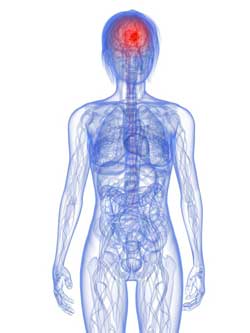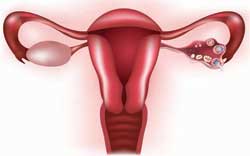Is Your PCOS Keeping You Up at Night?
Begin by watching the video above.
Women with Polycystic Ovarian Syndrome (PCOS) often confront a variety of sleep-related problems. You may be like some women who experience insomnia or others who experience snoring, a sign of obstructive sleep apnea (OSA).2 Women with PCOS (Polycystic Ovarian Syndrome) are at a much greater risk of sleep apnea than the general population, and you should be aware of how serious OSA can be. If your PCOS and sleep disorders are depriving you of a good night’s sleep, seek treatment today. Just know that lifestyle changes, such as better diet, exercise, and pharmaceutical or nutritional supplementation, can be the key to improving your sleep.
Of course dealing with a serious health issue can keep women up worrying, and Polycystic Ovarian Syndrome (as known as PCOD – Polycystic Ovary Disorder) definitely causes the kinds of symptoms that women worry about. But there is a difference between a condition sparking stress and one that induces real sleep disturbances. Unfortunately for the 25-30 percent of women of childbearing age who suffer from Polycystic Ovarian Syndrome (PCOS), this medical condition is one that can cause both stress and frustrating disturbances in their sleep patterns.
Are you dealing with the frustrating and sometimes devastating symptoms of PCOS?
If you’re not sure, take the PCOS self-test and find out.
The link between Polycystic Ovarian Syndrome and sleeping conditions, such as insomnia and sleep apnea, is not entirely clear. However, weight gain and an underlying hormonal imbalance have both been implicated as likely factors in PCOS and sleep apnea.
Causes
How Are PCOS and Sleep Disturbances Related?
Although Polycystic Ovarian Syndrome (PCOS) is fairly common, it’s a condition that  medical researchers are still studying. Because of the relatively small amount of information available about this condition, the connection between Polycystic Ovarian Syndrome (PCOS) and sleep disturbances is still not well known, as are the links between it and other related conditions.4
medical researchers are still studying. Because of the relatively small amount of information available about this condition, the connection between Polycystic Ovarian Syndrome (PCOS) and sleep disturbances is still not well known, as are the links between it and other related conditions.4
Doctors do know, however, that weight gain and hormonal imbalances are at least partially to blame for two of the most common sleep disorders that women with this condition face, in particular insomnia and sleep apnea.
Insomnia can take many different forms, from the inability to initially fall asleep to the inability to stay asleep. Sleep apnea, on the other hand, poses a much more serious threat because it causes women to stop breathing while they sleep. Oftentimes, this condition results in snoring and exhaustion, as well as headaches and irritability.3
In addition to being an inconvenience, sleep apnea can pose a serious halth threat to women who are struggling with Polycystic Ovarian Syndrome (PCOS). Sleep apnea can cause women to feel as though they are choking or gasping for breath in their sleep, which, sometimes, they are.2
Symptoms
PCOS: What Is It?

Polycystic Ovarian Syndrome (PCOS) is a hormonal imbalance that occurs when a woman develops inordinately high levels of androgens. Dubbed “male” sex hormones because these hormones, testosterone in particular, are present in higher levels in men, these androgens can wreak havoc on the attempts of the female hormones, most notably estrogen, progesterone, luteinizing hormone (LH), and follicle-stimulating hormone (FSH), to maintain proper control over the female reproductive system. With the interference of the androgens, functions such as menstruation and ovulation are thrown off course. PCOS is also linked to a condition called Insulin Resistance, which is when your cells become resistant to insulin as a result of spikes in blood sugar based on a woman’s diet.
The result of this hormone imbalance is a long list of symptoms, including:1
- Infertility:? One of the most devastating symptoms of Polycystic Ovarian Syndrome (PCOS), infertility is a condition that can dash dreams of becoming a mother and cause tension within a marriage. Polycystic Ovarian Syndrome (PCOS) is one of the leading causes of infertility and is also one of the most common ways in which women find out they have this condition.
- Sleep Disturbances:? From sleep apnea to insomnia, women with Polycystic Ovarian Syndrome (PCOS) are less likely to get a good night’s sleep than women who don’t have PCOS.
- Hirsutism:? The excessive growth of hair in embarrassing places, such as the face, chest, and back, hirsutism is one of the more visible and difficult symptoms to cope with this condition causes.
- Hair Loss:? Loss and thinning of hair are common in women with PCOS, and this symptom often occurs in the same way as male pattern baldness due to excess testosterone levels.
- High Blood Pressure and High Cholesterol:? These two symptoms go hand in hand and are very important to monitor, because women with Polycystic Ovarian Syndrome (PCOS) are at an increased risk for stroke and heart-related complications.
- Skin Conditions:? Ranging from mild to severe, issues such as acne, skin tags, acanthosis nigricans (the development of thick, dark patches of skin), dry skin, and dandruff are all issues that women with Polycystic Ovarian Syndrome (PCOS) have to deal with. In addition to being painful, these symptoms are often very visible and embarrassing.
- Polycystic Ovaries:? Alhough ovarian cysts are not a prerequisite for Polycystic Ovarian Syndrome (PCOS), they are often a tell-tale sign the condition is present.
- Weight Gain and Obesity:? Excess weight gain is also a common symptom that women with this condition undergo, and the inability to drop that weight is a struggle these women face on a daily basis. Obesity is a symptom that not only indicates Polycystic Ovarian Syndrome (PCOS), it exacerbates it, making the condition more difficult to live with and more serious to one’s health.
- Infrequent, Sporadic, or Absent Menstrual Periods:? Caused by the excess testosterone in their system, many women with PCOS do not have a properly functioning menstrual cycle.
- Anovulation:? A lack of ovulation is another key symptom of Polycystic Ovarian Syndrome (PCOS) and is also one of the causes of infertility.
- Further Health Complications:? Women with Polycystic Ovarian Syndrome (PCOS) not only have to live with unique combinations of the above symptoms, they are at a higher risk for many other serious conditions, including heart disease, Type 2 diabetes,5 endometrial cancer, and breast cancer. Additionally, Polycystic Ovarian Syndrome (PCOS) is often influenced by Insulin Resistance, which forces women to grapple with the inability to utilize insulin that allows conversion of glucose (blood sugar) into energy.
Treatment Options
Getting Better Sleep with PCOS
Although it can be difficult to get a good night’s sleep with the sleep disturbances caused by Polycystic Ovarian Syndrome,6 there are several ‘tricks’ you can try when attempting to get a better night’s rest.
- Do not take naps. By sleeping throughout the day, your body’s sleep pattern will become skewed, and falling asleep at night will become even more difficult.
- Stick to your routine. Creating a pattern of sleep is important, as is following this pattern on weekends. Going to bed and waking up at the same time every day will help your body settle into a normal sleeping habit.
- Relax before heading to bed. It is difficult to turn off the million and one thoughts that run through your mind at the end of the day, so taking a breather before heading to bed will help soothe your mind and prepare your body for sleep.
- Do not sleep unless you are tired. Although this may seem counterintuitive to creating a normal sleeping pattern, lying in bed without being able to sleep only make matters worse. Get up and be productive until sleep comes.
- Train your body to recognize the bed. Instead of reading and watching television in bed, designate the bed as a sleep-only zone. This will help cue your body for sleep.
 Do not eat or drink stimulants before going to bed. Coffee, tea, soda, chocolate, and other forms of caffeine and sugar should be avoided before bedtime to allow your body to relax naturally.
Do not eat or drink stimulants before going to bed. Coffee, tea, soda, chocolate, and other forms of caffeine and sugar should be avoided before bedtime to allow your body to relax naturally.- Cheat on your diet. Although you may be told not to eat after eight o’clock, going to bed hungry will ruin a sleep pattern. Eat a light snack, preferably a healthy dairy or protein treat, before going to bed if the hunger pangs have started to set in.
- Keep your bedroom comfortable. To decrease distractions, keep your bedroom clean and at a comfortable temperature.
Natural Therapies
Nipping the Problem in the Bud…Naturally

Although the previous tips to avoiding sleep disturbances are wonderful, so is the potential to control Polycystic Ovarian Syndrome and naturally dispel the symptoms it creates. Although the process isn’t difficult, it does require a great deal of willpower on your part.
- Exercise as much as possible. Although physical limitations can present challenges, every woman with Polycystic Ovarian Syndrome should be as active as possible without pushing the limits too far.
- Eat a healthy diet. Include complex carbohydrates high in fiber and low on the glycemic index. Additionally, steer clear of sugary foods and those made up of simple carbohydrates.
- Enlist the help of a support system. Keeping up with a healthy diet and exercise routine is not as easy as it appears on paper, but with the encouragement and support of other women who have gone through the same process it can become a positive experience. Additionally, emotional support is invaluable when PCOS becomes overwhelming.
- Take targeted nutritional supplements. These special blends of vitamins, minerals, and botanicals can help fortify the body in the ways it needs to heal from Polycystic Ovarian Syndrome and the symptoms it causes.
- Learn as much as you can. Learn about PCOS, its symptoms and its primary underlying cause of Insulin Resistance. Knowing as much as you can will empower you in discussing your condition with your doctor and in dealing with PCOS.
Sleep disturbances can present a very frustrating obstacle for women with Polycystic Ovarian Syndrome. By doing all you can to get better sleep, keeping to a healthy diet, and exercising as often as possible, you can improve your sleeping patterns and, in the process, your overall wellbeing. For more information on how to remedy Insulin Resistance, an influencing factor of PCOS, contact Insulite Health for articles, news, and nutritional supplements to help you win the fight against Polycystic Ovarian Syndrome.
Next Steps
- Take the PCOS Quiz! Get your score and assess your hormone health risks.
- Join our Facebook Sisterhood Group Pose your questions to this group of like-minded women. Get the answers to your questions and the support you need.
- Checkout the Hormone Reset. Guided Practices to eliminate anxiety, lose weight and boost energy.
We are committed to helping women reverse their symptoms of hormone imbalance – a major cause of excess weight gain, adult acne, unwanted facial hair, depression, anxiety, and heartbreaking female infertility.
©Insulite Health empowers women with hormone imbalance to transform their lives through a process of healing with the Natural Hormone Solution –a complete solution for helping women reverse the symptoms hormone imbalance..

 Do not eat or drink stimulants before going to bed. Coffee, tea, soda, chocolate, and other forms of caffeine and sugar should be avoided before bedtime to allow your body to relax naturally.
Do not eat or drink stimulants before going to bed. Coffee, tea, soda, chocolate, and other forms of caffeine and sugar should be avoided before bedtime to allow your body to relax naturally.